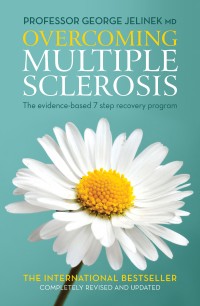
Overcoming MS with lifestyle changes
Professor George Jelinek is the author of the book Overcoming Multiple Sclerosis and founder of the program Overcoming MS (OMS) which treats symptoms of Multiple Sclerosis (MS) by making lifestyle and dietary changes.
When Jelinek was diagnosed with MS, he was 45 and fully immersed in his career. He was the first Professor of Emergency Medicine in Australia, and oversaw both the academic and university departments at Sir Charles Gairdner Hospital. Jelinek met with his former mentor, Dr Ian Hislop, who encouraged him to take a leave of absence to focus on his own health. During this time, Jelinek began researching preventive medicine treatments for MS, to reduce his risk of progression to disability. He found many studies, two of which stood out, one by the Belgian School of Public Health and the other by Professor and Neurologist Roy Swank, that helped direct him toward formulating his program.

Jelinek is living proof that changing lifestyle and diet can provide drastic relief for symptoms of MS. The Overcoming MS program includes maintaining a healthy lifestyle and diet (plant-based with seafood), meditating, exercise, and exposure to sunshine. Linda Bloom was one of the first patients to try Jelinek’s program. Before beginning the Overcoming MS program, Bloom felt extremely fatigued and numb. However, following the regimen allowed her to regain her strength and eventually climb Mt Kinabalu. She considers herself recovered from MS as a result of Jelinek’s program.
Another individual who turned to Jelinek’s program to combat symptoms of MS was Dr Sam Gartland, a general practitioner. Gartland was originally skeptical about the program due to its contrast with his medical training. However, he went to a retreat hosted by Jelinek and began following the Overcoming MS program. Today, Gartland is free of his MS symptoms and exercises frequently.
Obviously, personal experiences of relief from the symptoms of MS through lifestyle changes needed to be confirmed by research and Jelinek with his strong research and evidence perspective was ideally placed to do just that. By way of example, in 2012, Jelinek conducted a study of individuals varying in age with MS from more than fifty-five countries. The study revealed that individuals with the healthiest diets are the least likely to become disabled due to MS.
Lifestyle modification has been found to be effective in both the prevention and treatment of non-communicable diseases, with the World Health Organisation estimating that approximately 80 per cent of these diseases could be prevented with a healthy diet, physical activity, avoiding tobacco and moderating alcohol consumption.
Today, Overcoming MS is an established non-profit charitable organisation in Australia, the UK and the USA, with a global community of people benefiting from the program. The OMS website provides a wealth of information, from diet and medication to research for medical professionals, and importantly, support for MS sufferers and their families the world over.
1) Bradley, Sharon. “An MS diagnosis led Professor George Jelinek’s quest to stop history repeating.” The Sydney Morning Herald. 21 Jan. 2017.
2) Bowden, Tracey. “Multiple sclerosis: Doctors back unconventional treatment.” ABC.net.au. 15 Mar. 2017.
3) Arena, Ross et al. “Medical Training to Achieve Competency in Lifestyle Counseling: An Essential Foundation for Prevention and Treatment of Cardiovascular Diseases and Other Chronic Medical Conditions.” American Heart Association (2016): 308-327.
4) Overcoming Multiple Sclerosis. 2015. Web.



